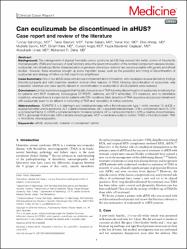| dc.contributor.author | Sahutoğlu, Tuncay | |
| dc.contributor.author | Baştürk, Taner | |
| dc.contributor.author | Şakacı, Tamer | |
| dc.contributor.author | Koç, Yener | |
| dc.contributor.author | Ahbap, Elbis | |
| dc.contributor.author | Sevinç, Mustafa | |
| dc.contributor.author | Kara, Ekrem | |
| dc.contributor.author | Ünsal, Abdulkadir | |
| dc.date.accessioned | 2020-12-19T19:50:34Z | |
| dc.date.available | 2020-12-19T19:50:34Z | |
| dc.date.issued | 2016 | |
| dc.identifier.citation | Sahutoglu, T., Basturk, T., Sakaci, T., Koc, Y., Ahbap, E., Sevinc, M., Kara, E., Akgol, C., Caglayan, F. B., Unsal, A., & Daha, M. R. (2016). Can eculizumab be discontinued in aHUS?: Case report and review of the literature. Medicine, 95(31), e4330. https://doi.org/10.1097/MD.0000000000004330 | en_US |
| dc.identifier.issn | 0025-7974 | |
| dc.identifier.issn | 1536-5964 | |
| dc.identifier.uri | https://doi.org/10.1097/MD.0000000000004330 | |
| dc.identifier.uri | https://hdl.handle.net/11436/2444 | |
| dc.description | sevinc, mustafa/0000-0003-2804-4884; Sahutoglu, Tuncay/0000-0003-2015-4421 | en_US |
| dc.description | WOS: 000380789800022 | en_US |
| dc.description | PubMed: 27495036 | en_US |
| dc.description.abstract | Background: the management of atypical hemolytic uremic syndrome (aHUS) has evolved into better control of thrombotic microangiopathy (TMA) and recovery of renal functions since the recent introduction of the terminal complement cascade blocker, eculizumab, into clinical use. Better characterization of genotype phenotype relations has become possible with genetic and clinical studies. However, these advances brought up some important issues, such as the possibility and timing of discontinuation of eculizumab and strategy of follow-up that need to be enlightened. Case Summary: One of our aHUS cases with a novel complement factor H mutation, who developed unusual laboratory findings (thrombocytopenia and mild creatinine elevation without other features of TMA) following discontinuation of eculizumab was presented. Literature and case reports relevant to discontinuation of eculizumab in aHUS patients were reviewed. Conclusion: Limited experience suggests that the risk of recurrence of TMA following discontinuation of eculizumab is relatively low for patients with MCP mutations, homozygous CFHR3/R1 deletions, anti-CFH antibodies, CFI mutations, and no identifiable mutations, whereas there is a major risk for patients with CFH mutations. Early detection of TMA recurrence and prompt retreatment with eculizumab seem to be efficient in controlling of TMA and restoration of kidney functions. | en_US |
| dc.language.iso | eng | en_US |
| dc.publisher | Lippincott Williams & Wilkins | en_US |
| dc.rights | info:eu-repo/semantics/openAccess | en_US |
| dc.subject | aHUS | en_US |
| dc.subject | Eculizumab | en_US |
| dc.subject | Mutation of complement factors | en_US |
| dc.title | Can eculizumab be discontinued in aHUS? Case report and review of the literature | en_US |
| dc.type | review | en_US |
| dc.contributor.department | RTEÜ, Tıp Fakültesi, Dahili Tıp Bilimleri Bölümü | en_US |
| dc.contributor.institutionauthor | Kara, Ekrem | |
| dc.identifier.doi | 10.1097/MD.0000000000004330 | |
| dc.identifier.volume | 95 | en_US |
| dc.identifier.issue | 31 | en_US |
| dc.ri.edit | oa | en_US |
| dc.relation.journal | Medicine | en_US |
| dc.relation.publicationcategory | Diğer | en_US |


















